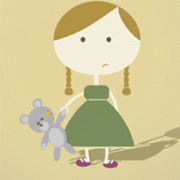Protecting our children from sexual abuse
April 13, 2015
Article at a Glance
- Reduce your children’s risk by carefully evaluating and limiting (when possible) any time spent in isolated, one-on-one situations with other children, youth, and adults.
- Educating your children about sexual abuse doesn't mean they won't ever become a victim, but it does offer an important line of defense.
- Children who have been prepared will know how to respond to any threats and will feel more comfortable coming to talk to you.
National Child Abuse Prevention Month and Sexual Assault Awareness Month
April 6, 2015
Article at a Glance
- One in six boys and one in four girls will experience some form of sexual abuse before the age of 18.
- In about 90 percent of cases, children are abused by somebody who is known and trusted by the child and the child’s family.
- Be sure to report to the authorities if you suspect child abuse, find child pornography, or if a child discloses abuse to you.
The “5 Rs” of early education
March 30, 2015
Article at a Glance
- Reading, rhyming, routines, rewards, and relationships help young children develop the social, language, and emotional skills needed for healthy brain development.
- The first 1,000 days of life are particularly important because it provides the foundation for future development.
Learning how to drive starts now
March 23, 2015
Article at a Glance
- At a very young age children are already learning driving habits from their parents’ examples.
- Learning how to drive well is important—motor vehicle fatalities are the leading cause of death for 15 to 20 year olds.
- Set a good example when driving and take time to teach your children about traffic laws.
Recent study confirms safety of two measles vaccines
March 2, 2015
Article at a Glance
- Study found that the risk of negative reactions from the vaccines was incredibly low.
- No new safety concerns were found for the MMRV or MMR + V vaccines.
Sleeping with a smartphone can disrupt your child’s sleep
February 16, 2015
Article at a Glance
- Children who sleep with a smartphone or tablet in their room get less sleep and report feeling less well-rested than those who don’t.
- Having a TV in the bedroom also contributed to less sleep, but had less effect than a small screen device.
- Sleep plays an important role in a child’s mental and physical development.
What you should know about using antibiotics
February 9, 2015
Article at a Glance
- Antibiotics cannot cure a viral infection and the side effects could make you feel sicker longer.
- Using antibiotics when they are not needed can cause antibiotic resistance; this is when antibiotics no longer work on disease-causing organisms.
- Do not insist on taking antibiotics unless they are needed and be sure to always take them exactly as prescribed by the doctor.
Detergent pods responsible for thousands of child injuries
January 26, 2015
Article at a Glance
- Detergent pods are responsible for thousands of child eye injuries and poisonings.
- The highly concentrated detergent inside the pods is much more dangerous than regular detergents.
- Detergent pods should be treated like other poisons and kept out of the reach of children.
Are you giving your child the right dose?
January 19, 2015
- Two recent studies draw attention to a major public-health problem—medication errors involving children.
- Every 8 minutes a child is given the wrong drug or given the wrong dose
- Using teaspoon or tablespoon measurements can double the chance of dosing errors.
- Before you leave the doctor’s office make sure you understand how, when, and for how long your child should take any medication.
Pneumococcal vaccine reduces serious superbug infections
December 29, 2014
Article at a Glance
- The pneumococcal vaccine is linked with a 62 percent decrease in antibiotic-resistant cases of pneumococcal infections.
- This vaccine is an important step in preventing the spread of antibiotic-resistant superbugs.
- The pneumococcal vaccine is recommended for children under five years old, adults 65 or older, or people with health conditions that put them at a higher risk.
Article Types
Archives
Sign up to our Newsletter









